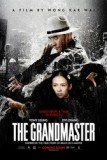| Reviews & Columns |
|
Reviews DVD TV on DVD Blu-ray 4K UHD International DVDs In Theaters Reviews by Studio Video Games Features Collector Series DVDs Easter Egg Database Interviews DVD Talk Radio Feature Articles Columns Anime Talk DVD Savant Horror DVDs The M.O.D. Squad Art House HD Talk Silent DVD
|
DVD Talk Forum |
|
|
| Resources |
|
DVD Price Search Customer Service #'s RCE Info Links |
|
Columns
|
|
|
Grandmaster, The
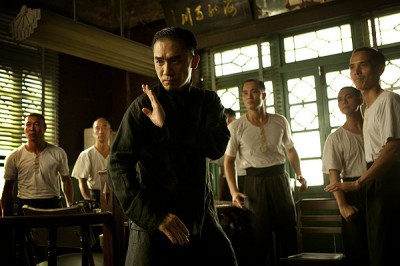
Preamble: As a big Wong Kar-Wai fan, I feel I need to write two reviews of his new movie The Grandmaster, his first since 2007's much misunderstood My Blueberry Nights. As with that film, his English-language debut, The Grandmaster seems to have arrived on U.S. shores with baggage it doesn't really deserve to carry. In this case, a much ballyhooed and bemoaned new cut made specifically for American audiences.
Having seen both the original international version and the new theatrical release, prepared by Wong in deference to his North American distributors, I'm faced with the conundrum of writing a review that recommends whether or not my specific readership should go see The Grandmaster in the theater, knowing what I know about the changes made and how it affects one's viewing of the movie. Here are the questions I face:
1. Is it fair not to take the U.S. theatrical cut on its own merits? Probably not, since that is going to be the version most readily available for the time being.
2. Is the U.S. presentation as good as Wong Kar-Wai's original version? No.
3. Is it a decent movie all the same? Yes. Though your enjoyment of it, really, still depends either on how much you are a kung-fu movie fan and/or a Wong Kar-Wai fan. Which is the most perplexing element of this whole kerfuffle: if you are either of those things, the edit doesn't serve your needs as a cinephile; if you're neither of those things, Harvey Weinstein hasn't figured out the magical formula to make you one or the other, much less both. He wants to make you think you're going to see Crouching Tiger, Hidden Dragon and recapture that film's crossover success; instead, he's likely going to end up repeating Focus' misguided attempts to sell The American as a Bourne-style action flick, a tactic that ensured that an otherwise excellent movie was seen by the wrong audience.
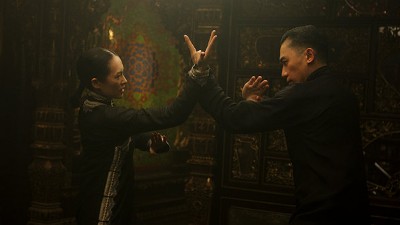
So, here we go, Review #1: Martin Scorsese presents The Grandmaster (U.S., 2013): Tony Leung (Infernal Affairs) stars in the new Wong Kar-Wai kung-fu movie, The Grandmaster, as Ip Man, a legendary figure in the Chinese martial arts scene, best known for popularizing the wing chun fighting style and for training Bruce Lee. This is not the first Ip Man film. There have been many before this. He is a legendary figure, and if you consider kung-fu movies to be the Chinese equivalent of our westerns, then one could compare him to someone like Wyatt Earp. He's a historical figure whose actual story has largely been overtaken by fiction and legend.
The Grandmaster follows Ip Man's life from the late 1930s through the mid-1950s. At the start of the movie, he is an unknown martial artist who is tapped by his peers to represent the South in a showdown with their rivals in the North. A revered grandmaster, Gong Yutian (Qingxiang Wang, Red Cliff), is retiring, and he is hoping to unify the two regions in advance of growing unrest and outside pressures. The sparring match between him and Man will serve as a kind of object lesson for the other martial artists. Ip Man's lack of station, however, ruffles feathers with Gong's successor, Ma San (Jin Zhang, Wushu), and his daughter, Gong Er (Zhang Ziyi, House of Flying Daggers). While the rift with Ma San is permanent, a friendship and a long-distance love affair develops between Ip Man and Gong Er.
All of this is interrupted, however, by the invasion of the Japanese and the years of war that follow. During this time of unrest, everything changes, connections are lost, and by the late 1940s, most of the kung-fu grandmasters have been exiled to Hong Kong. This is where Ip Man and Gong Er will finally be reunited, and where he will also encounter a scoundrel known as "The Razor" (Chen Chang, 2046), who is sort of the mirror image to Ip Man. In the kung-fu world, everything has its equal and necessary opposite. It's in Hong Kong where Man becomes a teacher.
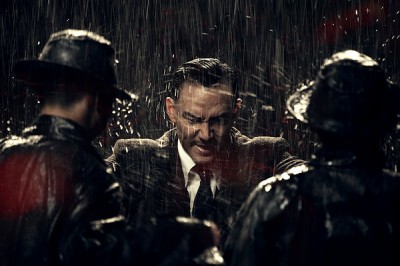
This is a pretty complicated story that draws on an even more complicated history, much of which is glossed over and boiled down to explanatory title cards. (The early ones are helpful, the later ones are redundant.) With the exposition set aside in this manner, The Grandmaster ends up largely being a fight movie, with different kung-fu masters showing their skills and at least one important fight, the showdown between Gong Er and Ma San, carrying bigger consequences. The skirmishes are, in a word, spectacular. Choreographed by famed stunt choreographer Woo-ping Yuen (The Matrix, the aforementioned Crouching Tiger, Hidden Dragon), the various showdowns are a complex blur of hands and limbs, set up like a physical puzzle. If Ip Man leads with this move, Gong Er counters with that move, leading to the next defense, etc. It's not really a competition about who is stronger or more punishing or even that visceral bing-bang-boom of a boxing movie or a street fight. It's about skill and dexterity and the philosophy behind each fighting style.
This can be very exciting, particularly as Wong and his cinematographer Philippe Le Sourd (Seven Pounds) shoot the movie in Wong's signature style: a combination of slow-mo, filters, and other fancy-schmancy techniques I've never learned the name for. The Grandmaster's individual images and scenes are built as a combination of small moments--just like the fights. A close-up on Ip Man's eyes, then his hat, then a long shot of the bodies, then a slowed-down kick, etc. It's lovely to look at, particularly given the attention to detail applied to the chosen battlefields. There are gorgeous showdowns in both rain and snow, as well as several match-ups in a gilded brothel.
Amidst all this are Wong Kar-Wai's usual ruminations on memory and fate and the failure of individuals to connect. Ip Man and Gong Er are a perfect match who can never be, bound as they are by duty and social convention. Tony Leung is, as ever, a perfect leading man, handsome and commanding, every bit as impressive a contemporary romantic figure as George Clooney. As his counterpart, Zhang Ziyi has graduated from precocious ingénue roles and now carries herself as a woman of emotional weight. Her character has the most compelling changes to go through, and she also has the most impressive fight.
That said, as with previous Wong Kar-Wai efforts, the audience is left to read between the lines and fill in much of the blanks. His visual poetry doesn't connect the dots for you...which is the worst irony of the U.S. edit of The Grandmaster: while the studio has made the story more clear and easier to understand, they've removed the emotional core from the movie, undercutting the beauty and depth of meaning that exists in the original draft. Leading me to:

Review #2: Martin Scorsese and Harvey Weinstein vs. The Grandmaster (China, 2013): The original full-length version of The Grandmaster released in China is kind of like a modern-history cousin to Wong Kar-Wai's wuxia epic Ashes of Time. In both, warriors of different stripes are faced with change, adversity, and loss. Both films use the combat lifestyle as a backdrop, but by the time of Ip Man, kung fu is not so much a necessity as it is a function of identity, providing a sense of belonging and, in some cases, a job. At the same time, dedication to the craft still has a personal toll attached to it.
For Ip Man and the other martial artists in The Grandmaster, kung fu is their connection to a culture that is rapidly disappearing. As China is changing, so too is its traditions. This is touched on in the U.S. version of The Grandmaster, and to be fair, the political ramifications of Gong's challenge to Ip Man and his fellow Southerners is explained better by the opening title cards; however, the shortened film lacks the thematic scope of the original. The trims to the narrative take some of the consequence out of the events, particularly as the editorial scissors mostly snip out the personal details. Ip Man's wife has all but a couple of very brief appearances removed, lessening the impact of her betrayal. Likewise, Gong Er's defiance of her father and her resultant sacrifice is glossed over. Even the removal of the Razor subplot means that there is no connection between the two of them, and no hint of Gong Er's role in the resistance, an added counterpoint to the rift between her family and Ma San, who collaborates with the Japanese invaders.
American audiences will see a movie that is, essentially, no different than a sports film, where athletes must accept that age and fashion will inevitably take them out of the game. Audiences elsewhere have gotten a film where its heroes are subject to the push-pull of time and growth, of wanting to forge ahead but also needing to look back, to see the cumulative experience and the wealth of knowledge that got you there. Living is not about charging forward and chasing your impulse, it's about being humble enough to realize you don't know everything, that you stand on a foundation. Call it what you will: history or tradition. "All encounters of this world are a kind of reunion"--Ip Man says it in both versions, but it comes up again late in the original when he and Gong Er have their second farewell. We've been here before: we lived, we met, and we parted. In the grand scheme of things, as individuals, we are nothing new.
Perhaps more destructive, however, is the gutting of the film's middle section, of the removal of most of Ip Man's wartime experience, and the transfer of Gong Er's story to flashback. Not only does our not knowing what she has been through lessen her reunion with Man, but it also lessens the suspense regarding her resolution with Ma San, the only part of her section to remain in its original location. Beyond what it does to her character arc, the shuffling of events ruins what I think is essential to The Grandmaster's narrative structure.
Forget Ip Man's comparing stages of his life to seasons, the real key to cracking the movie's structural code is the final advice from her father that Gong Er shares with Ip Man: "My father said mastery had three stages: being, knowing, doing." The Grandmaster, in its original form, had three stages, as well. The early part, prior to the full-press invasion of the Japanese, when the martial artists could spend time testing the strength of their skills and their schools, was an act of being; when the war comes, and their resolve is challenged, they learn the harsh truths of life, and this is knowing; and finally, when to survive they make practical choices for how to apply their talents, they are finally doing. The U.S. edit scoops out the knowing because, you know, Americans are stupid and can't learn anything anyway.
In effect, by removing the substance of the interpersonal relationships, the U.S. cut of The Grandmaster has less heart, and by excising the great lessons learned, it also has a smaller mind. About the only thing it does right is the restoration of the meeting of Ip Man and Razor, a scene absent from the longer version. When I watched the first cut, I was unsure of where the character fit into the scheme of things, he seemed somewhat extraneous. I assumed it was a bit like Maggie Cheung's appearance in 2046, that Wong Kar-Wai had originally shot more with Chen Chang and then cut it down in the editing. This addition seems to prove I was right, and would make for an excellent inclusion in any master cut down the way.
Conclusion: The U.S. version of The Grandmaster is not a bad movie, but it is a lesser movie. It is reeks of the kind of studio interference that cinema fans have long gnashed their teeth over, be it for Orson Welles' Touch of Evil or Ridley Scott's Blade Runner or any other movie where a filmmaker's vision was sacrificed to financial concern. That Martin Scorsese has put his name out in front of this is a particular black eye for someone who has otherwise been a great champion of artists and their work. Even if Wong Kar-Wai was as on board as the public relations spin says he was, Scorsese should have known to talk him out of it. Imagine someone telling him that he should recut Raging Bull to make sure Chinese audiences knew who Sugar Ray Robinson was.
When I was a kid, I read many classic books as condensed, illustrated versions that, oddly enough, I picked up as the prize in McDonald's Happy Meals. Novels like The Three Musketeers and Moby Dick were rewritten and shortened to fit an elementary school reading level. The stories still intrigued me, but the experience was totally different. I wasn't challenged; instead, the material stooped down to a level where anyone could meet its gaze.
That's what they've done to The Grandmaster. They decided to chop it down so that no one has to rise to the mystery and inspiration it offers. In doing so, not only do the butchers condescend to us as the audience, but they prove they're the ones who are stupid for having no real idea of what kind of moviegoer The Grandmaster was made for. You know, like an adult buying a Happy Meal and pretending it's a dinner fit for a grown man. The added prize? Nausea and unease.
Final Ratings: U.S. cut, 3 stars; Original Cut, 4 stars
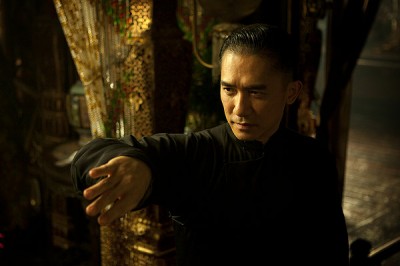
Jamie S. Rich is a novelist and comic book writer. He is best known for his collaborations with Joelle Jones, including the hardboiled crime comic book You Have Killed Me, the challenging romance 12 Reasons Why I Love Her, and the 2007 prose novel Have You Seen the Horizon Lately?, for which Jones did the cover. All three were published by Oni Press. His most recent projects include the futuristic romance A Boy and a Girl with Natalie Nourigat; Archer Coe and the Thousand Natural Shocks, a loopy crime tale drawn by Dan Christensen; and the horror miniseries Madame Frankenstein, a collaboration with Megan Levens. Follow Rich's blog at Confessions123.com.
|
| Popular Reviews |
| Sponsored Links |
|
|
| Sponsored Links |
|
|
| Release List | Reviews | Shop | Newsletter | Forum | DVD Giveaways | Blu-Ray | Advertise |
|
Copyright 2024 DVDTalk.com All Rights Reserved. Legal Info, Privacy Policy, Terms of Use,
Manage Preferences,
Your Privacy Choices | |||||||









